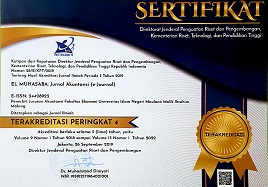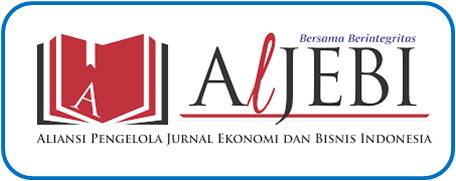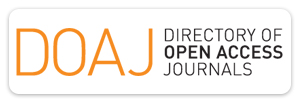“Mosukuru To Eya” Uncovering The Local Cultural Values Behind Profit
Abstract
Purpose: This study aims to find the value of local wisdom behind income accounting practiced by traders in Gorontalo food stalls.
Method: This study uses an Islamic paradigm with an Islamic ethnomethodological approach. There are five data analysis stages: charity, knowledge, faith, revelation information, and good deeds.
Results: The study found that traders earn higher income on Thursday and Sunday nights. Meanwhile, traders experienced a decrease in their income during the Covid 19 pandemic. Traders used their income to finance operational, personal, and charity business needs. The income accounting practice lives with gratitude to God (mosukuru to Eya). In Islamic culture, elders often internalize these values through lumadu "diila o'onto, bo wolu-woluwo" which means invisible but there.
Implications: The implication of this research is that it is an effort to preserve local culture-based income accounting.
Novelty: This study presents the concept of income accounting based on local cultural values of the Gorontalo people.
Keywords
Full Text:
PDFReferences
Alfia, Yulis DIana. Triyuwono, Iwan. Mulawarman, A. D. (2018). Kritik atas Tujuan Akuntansi Syariah: Perspektif Realitas Sadrian. Akuntansi Dan Istem Informasi, 3(2), 93–111. https://doi.org/10.32486/aksi.v2i2.266
Ataufiq, M. M. (2017). Penerapan Tradisi Payango pada Rumah Tinggal Masyarakat Gorontalo sebagai Upaya Pelestarian Budaya Lokal. Seminar Ikatan Peneliti Lingkungan Binaan Indonesia (IPLBI), A033–A040. https://doi.org/10.32315/sem.1.a033
Azwari, P. C. (2018). Rekonstruksi Perlakuan Akuntansi Untuk Entitastempat Ibadah (Studi Perlakuan Akuntansi Organisasi Masjid Berdasarkan Psak 45 Dan Psak 109). I-Finance: A Research Journal on Islamic Finance, 4(1), 84–101. https://doi.org/10.19109/ifinance.v4i1.2304
Baruadi, K., & Eraku, S. (2018). Lenggota Lo Pohutu (Upacara Adat Perkawinan Gorontalo) (T. Paedasoi, Ed.). Ideas Publishing.
Briando, B., Triyuwono, I., & Irianto, G. (2017). Gurindam Etika Pengelola Keuangan Negara. Jurnal Akuntansi Multiparadigma, 2001. https://doi.org/10.18202/jamal.2017.04.7036
Cooper, C., Neu, D., & Lehman, G. (2003). Globalisation and its Discontents: A Concern about Growth and Globalization. Accounting Forum, 27(4), 359–364. https://doi.org/10.1046/j.1467-6303.2003.00110.x
Daulima, F. (2009). Lumadu (Ungkapan) Sastra Lisan Daerah Gorontalo. Galeri Budaya Daerah Mbu’i Bungale.
Febrianti, D., Mas’adah, N., & Imawan, A. (2022). Pemanfaatan Informasi Akuntansi sebagai Alat Reposisi UMKM dalam Menghadapi Covid-19. Media Mahardhika, 21(1), 41–61. https://doi.org/10.29062/mahardika.v21i1.521
Garfinkel, H. (1967). Studies in Ethnomethodology. New Jersey.
Hardilawati, W. laura. (2020). Strategi Bertahan UMKM di Tengah Pandemi Covid-19. Jurnal Akuntansi Dan Ekonomika, 10(1), 89–98. https://doi.org/10.37859/jae.v10i1.1934
Ikatan Akuntan Indonesia. (2012). Standar Akuntansi Keuangan. Salemba Empat.
Jasin, J. (2015). Value in Executing Tumbilo Tohe (Pairs of Lights) Each End of Ramadan As One Manifestation of the Practice of Pancasila by People of Gorontalo. Journal of Humanity, 3(1), 1–13. https://doi.org/10.14724/03.01
Jeacle, I. (2009). Accounting and everyday life: Towards a cultural context for accounting research. Qualitative Research in Accounting and Management, 6(3), 120–136. https://doi.org/10.1108/11766090910973894
Kamayanti, A. (2016a). Fobi(a)kuntansi: Puisisasi dan Refleksi Hakikat. Jurnal Akuntansi Multiparadigma, 7, 1–16. https://doi.org/10.18202/jamal.2016.04.7001
Kamayanti, A. (2016b). Integrasi Pancasila Dalam Pendidikan Akuntansi Melalui Pendekatan Dialogis. Journal of Accounting and Business Education, 2(2), 1–16. https://doi.org/10.26675/jabe.v2i2.6063
Kamayanti, A. (2016c). Metodologi Penelitian Kualitatif Akuntansi Pengantar. Yayasan Rumah Peneleh.
Kamayanti, A. (2019). Akuntansi Keperilakuan Telaah Artikel, Role Play, Latihan dan Desain riset (Pembelajaran Dialogis) (A. D. Mulawarman, Ed.). Yayasan Rumah Peneleh.
Keiso, D. E., Weygant, J. J., & Warfield, T. D. (2007). Akuntansi Intermediete (Keduabelas). Erlangga.
Maili, Mashadi. S. W. (2018). Jaringan Islamisasi Gorontalo (Fenomena Keagamaan dan Perkembangan Islam di Gorontalo). Al-Ulum, 18(2), 435–458. https://doi.org/10.30603/au.v18i2.555
Mulawarman, A. D. (2013). Nyanyian Metodologi Ala Nataatmadja: Melampaui Derridian Mengembangkan Pemikiran Bangsa ‘Sendiri’. Jurnal Akuntansi Multiparadigma, 4(1), 149–164. https://doi.org/10.18202/jamal.2013.04.7189
Musdalifa, E., & Mulawarman, A. D. (2019). Budaya Sibaliparriq dalam Praktik Household Accounting. Jurnal Akuntansi Multiparadigma, 10(3), 413–432. https://doi.org/10.21776/ ub.jamal.2019.10.3.24
Nugraheni, A. P., Pramudyastuti, O. L., & Sunaningsih, S. N. (2020). Strategy of SMES in the Covid-19 Pandemic Period. Jurnal Akuntansi Dan Perpajakan Jayakarta, 2(1), 45–52. https://doi.org/10.53825/japjayakarta.v2i1.45
Nurhalimah, Setiawan, A. R., & Haryadi, B. (2019). Praktik Akuntansi Manajemen Bisnis Besi Tua Berbasis Budaya Persaudaraan Madura. Jurnal Akuntansi Multiparadigma, 10(1), 1–21. https://doi.org/10.18202/jamal.2019.04.10001
Rianty, M., & Rahayu, P. F. (2021). Pengaruh E-Commerce Terhadap Pendapatan UMKM Yang Bermitra Gojek Dalam Masa Pandemi Covid-19. Akuntansi Dan Manajemen, 16(2), 153–167. https://doi.org/10.30630/jam.v16i2.159
Sari, E. R. L., & Pravitasari, D. (2022). Pengaruh Persepsi E-Commerce, Modal Usaha, dan Penggunaan Sistem Informasi Akuntansi Terhadap Keputusan Berwirausaha di Pandemi Covid-19. Owner : Riset Dan Jurnal Akuntansi, 6(3), Article 3. https://doi.org/10.33395/owner.v6i3.868
Shima, K. M., & Yang, D. C. (2012). Factors affecting the adoption of IFRS. International Journal of Business, 17(3), 276–298.
Sugiyono. (2018). Metode Penelitian Kuantitatif, Kualitatif dan R&D. Alfabeta, CV.
Sylvia. (2014). Membawakan Cinta untuk Akuntansi. Jurnal Akuntansi Multiparadigma, 5(212). http://dx.doi.org/10.18202/jamal.2014.04.5012
Thalib, M. A. (2017). Akuntansi ‘Cinta’ Di Upacara Pernikahan Gorontalo, Studi Etnometodologi Islam. Brawijaya.
Thalib, M. A. (2019a). Akuntansi ‘Huyula’ (Konstruksi Akuntansi Konsinyasi Berbasis Kecerdasan Intelektual, Emosional, Spiritual, dan Sosial). Jurnal Riset Akuntansi Mercubuana, 5(1), 97–110. https://doi.org/10.26486/jramb.v5i2.768
Thalib, M. A. (2019b). Mohe Dusa: Konstruksi Akuntansi Kerugian. Jurnal Riset Dan Aplikasi: Akuntansi Dan Manajemen, 4(1), 11–31. https://doi.org/10.18382
Thalib, M. A. (2021). “ O Nga: Laa ” sebagai Wujud Akuntabilitas Biaya Pernikahan. Jurnal Riset Dan Aplikasi: Akuntansi Dan Manajemen, 5(1), 117–128. https://doi.org/doi.org/10.33795/jraam.v5i1.011
Thalib, M. A. (2022a). Menelusuri Makna Keuntungan dibalik Pelaksanaan Budaya Tumbilotohe: Studi Etnometodologi Islam. Sanskara Manajemen Dan Bisnis, 1(01), Article 01.
Thalib, M. A. (2022b). Exposing Household Cost Accountability Practices: A Study Of Islamic Ethnomethodology. The ES Accounting And Finance, 1(01), Article 01.
Triyuwono, I. (2015). Akuntansi Malangan: Salam Satu Jiwa dan Konsep Kinerja Klub Sepak Bola. Jurnal Akuntansi Multiparadigma, 6(2), 290–303. https://doi.org/10.18202/jamal.2015.08.6023
Triyuwono, Iwan. (2011). Angels Sistem Penilaian Tingkat Kesehatan Bank Syariah (pp. 1–21). Jurnal Akuntansi Multiparadigma. https://doi.org/10.18202/jamal.2011.04.7107
DOI: https://doi.org/10.18860/em.v14i2.18806
Refbacks
- There are currently no refbacks.
Editorial Office:
Megawati Soekarnoputri Building
Accounting Department, Faculty of Economics
Jln. Gajayana 50 Telp (0341) 558881
E-mail: elmuhasaba@uin-malang.ac.id
Universitas Islam Negeri Maulana Malik Ibrahim Malang
E-ISSN 2442-8922
P-ISSN 2086-1249

This work is licensed under a CC BY SA 4.0 International License


















